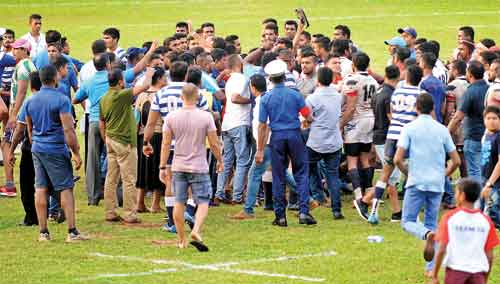‘Unparliamentary’ language taboo now at local Rugby matches
View(s): A proposal by Vice President and Chairman Tournament Committee, Sri Lanka Rugby (SLR) Council, Lasitha Gunaratne, to curb on-field crude and abusive language by players, has been accepted. It is acknowledged that resorting to derogatory, abusive language during the game is ugly and brings the game to disrepute,which all teams have been informed of. This is a good sign, as the stakeholders realise there are issues that bring the game into disrepute. Hopefully, soon they will also address the harm done by those who resort to despicable behaviour, when they are expected to be sensible in carrying out their responsibilities.
A proposal by Vice President and Chairman Tournament Committee, Sri Lanka Rugby (SLR) Council, Lasitha Gunaratne, to curb on-field crude and abusive language by players, has been accepted. It is acknowledged that resorting to derogatory, abusive language during the game is ugly and brings the game to disrepute,which all teams have been informed of. This is a good sign, as the stakeholders realise there are issues that bring the game into disrepute. Hopefully, soon they will also address the harm done by those who resort to despicable behaviour, when they are expected to be sensible in carrying out their responsibilities.
The post-match fracas that brings the game into disrepute needs addressing, as this happens when players and officials behave in an irrational manner, and spectators invade the field. The ugly sight was the same as in the Navy-CH match, previously seen again after the Police-Havelocks match. This time it started when a player threw the ball on another, which was followed by a retaliatory punch and another return punch.
Then the spectators and some from the bench got involved. These invasions of the field by spectators need to be curbed. The question is who will do that. Has the Match Commissioner (MC) a duty to report or, is it the job of the Citing Commissioner? The easy way out for some pundits is to say this happened after the game. Yes it did but, it was on the playing field.
The language used by players, at times, more often on their own, is very ‘unparliamentary’ and derogatory. It is most unpleasant to hear some phrases, and most times it is hard on the ears of women and children. But the stupidity is when some are told to cut out the language, they retort by saying they are talking to their own players. Some think using bad language spurs on their players. When Sinhala slang is used it sounds most distasteful. The question is who will bell the cat? Will it be the MC, who is glued to his chair and becomes a recorder of events. The buck will end in the hands of the Referee who can deal with it under misconduct.
The quote of the year is the mentor who tells a young Referee to get to a jockey position. I wonder whether he was talking of being in a jockey position or being a joker. The issue is who should be in the position: The Referee or the Mentor? World Rugby on officiating, asks and answers on whatis the ‘best’ position for the Referee in each situation? As simple as this question is, the answer is even simpler: There is no ‘best’ position applicable to any Referee in every situation. Positioning needs constant adaptations and the best position is never a fix-point, but a constant strive for the ‘best possible’ solution in that particular game situation with regard to the ball, the ball carrier, the opponent of the ball carrier, the position of the other players and the position on the pitch.
In simple terms it is BIO — Ball, Inside Out. Since there have been comments that nothing has happened for the last 10 years with the Referees, it is time for people not to look up and spit, as there are 4 who have done more than 10 years and 2 who have been there for 5 years, with some starting a second innings. I am trying to be helpful from the outside, as the blind seem to be leading the blind, who have been more blinded ‘AlaHameed’.
Getting back to the field of Rugby, the Police must be gnawing their knuckles for missing out on beating Havelocks Sports Club. Having tied the scores at 24-24, a regulation kick from under the posts was fluffed, and the upset of the season paled into a draw, with a melee that has no place in Rugby happened again.
Playing a game is one thing and playing to win is another. Police failed in that cause, though underdogs. Havelocks being No.2, should have played to win. However, it appeared as though the players were there to go through the motions. Havelocks did not play a game to be worthy winners, but Police did play well and deserved a win.
This draw has jeopardized the chances of Havelocks retaining the No.2 slot and currently, drop to 3rd place. They need Navy to go down to Kandy, while Kandy has little to worry at this stage. As I said before, CH did take the fight to Kandy and remains a side that has shown much improvement. They will continue as a side which can settle for No. 4 at least or, still better, as on form, they look good to win the next 3 matches.
Air Force did well to beat Army, but still continue to be one before last in the table, while the performance of CR remains below expectations, which will eventually have issues for Rugby, which is what CR is about. CR lie 5th and have an uphill task to oust CH from 4th place.
Going back to the Police-Havelocks game, what baffles me is why a reliable place kicker hurried for no reason. The need for composure and to be calm cannot be underscored at a time like this. The 90 sec allowed for a conversion, after a try, would have played on the mind, as earlier in the game, a kick at goal by Havelocks was disallowed for not taking the kick within the stipulated time.
 Social media is buzzing that “somebody told or thought the time allowed was 60 sec”. If so, who said so? There is also a question as to who Refereed the match? The poor sod, I am told he had an earful of directions from the sidelines. This is where a new Referee must understand that he is the Referee and is responsible. There is no litany needed through the match, but an occasional amen is what is recommended.
Social media is buzzing that “somebody told or thought the time allowed was 60 sec”. If so, who said so? There is also a question as to who Refereed the match? The poor sod, I am told he had an earful of directions from the sidelines. This is where a new Referee must understand that he is the Referee and is responsible. There is no litany needed through the match, but an occasional amen is what is recommended.
The men from the bench who ran onto the field to celebrate with a hug and call for a high-five, distracted the kicker, and also caused delay. I have seen this happen a number of times, when the medics, trainers and water carriers lose sight of their role and interfere too much. The members who entered the field were medics, whose job should have been to attend to the injured. If so, there is a lesson to be learnt by the support staff, that they have a job and should stick to it.
The other question that is discussed is the charge of the place kick. Was it legal in all aspects? Should there have been a re-kick, just as much as these questions arise, there need to be answers as to what is happening. These need reviews. Not to crucify, but to learn and correct. If we don’t, where is Rugby heading? That is a difficult question to answer, when there is an inability to answer. And also, when you don’t have an answer or those expected to answer do not know how to do so.
Vimal Perera is a former Rugby Referee, Coach and an Accredited Referees’ Evaluator IRB


